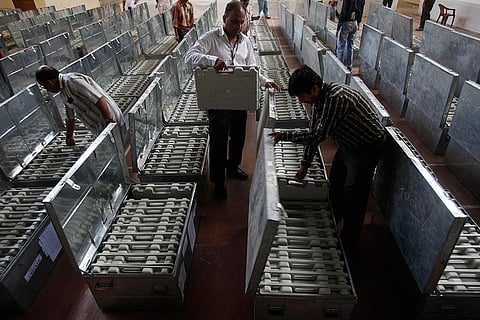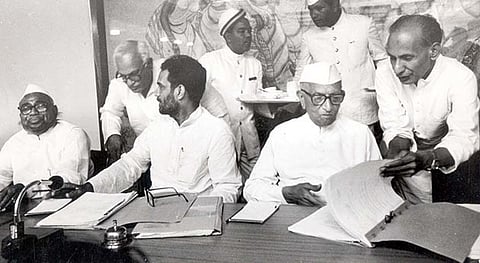The state in polities broadly described as ‘liberal democracies’ with political economies broadly described as ‘capitalist’ are characterised by a feature that Gramsci called ‘hegemony’. This is a technical term, not to be confused with the loose use of that term to connote ‘power and domination over another’. In Gramsci’s special sense, hegemony means that a class gets to be the ruling class by convincing all other classes that its interests are the interests of all other classes. It is because of this feature that such states avoid being authoritarian. Authoritarian states need to be authoritarian precisely because they lack Gramscian hegemony. It would follow from this that if a state that does possess hegemony in this sense is authoritarian, there is something compulsive about its authoritarianism. Now, what is interesting is that the present government in India keeps boastfully proclaiming that it possesses hegemony in this sense, that it has all the classes convinced that its policies are to their benefit. If so, one can only conclude that its widely recorded authoritarianism, therefore, is pathological.
An Alliance With We The People | By Akeel Bilgrami
Coalition-making and opposition to authoritarian politics must have not just form but content—and that content must come from the street, the farm...
There have been spectacular cases of this authoritarianism such as the recent arrest of five journalists and professors on charges that are virtually nonsensical. The liberal middle class has expressed some anger about these and, given how authoritarian the government has become, that took some courage. But Muslims and Dalits and, quite generally, the unprotected poor suffer from brutality and arbitrary arrest each day and this goes unreported even in the regional media. It is so pervasive that it is not news and it invokes nothing but indifference from the liberal middle class.
Quite apart from this compulsive tic of authoritarianism (compulsive, as I said, because it exists in spite of the more or less plausible claim to hegemony), a good question to ask is what underlies the hegemony itself? Before the 2004 election, there was a similar claim to hegemony by the then BJP government. All was said to be luminous, all classes were told to bask in the Indian sunshine and vote the government in again. The electorate refused. No doubt this was partly because of the unexpectedly impressive campaign carried out by Sonia Gandhi’s leadership.

But, more relevant to the question of hegemony is the fact that India was saved by its illiteracy. The propaganda of ‘India Shining’ by an uncritical press reached mostly the literate middle class. The illiterate among the electorate got a far better political education from their own experience of life and politics. They voted the government out.
What, then, was different in 2014? Well, for one thing there is no denying that apart from the period of the Emergency, the incumbency of UPA-II was about as bad a period of governance as has been known in independent India. But y’s failures cannot explain x’s hegemony, which can only be explained by x’s success in convincing others that the interests of those it represents are the interests of all. And this was achieved not merely by the media (as cheerleading as before and possibly with wider influence now as a result of an increase in its reach) but, as is well known, by a swaggering leader’s charisma.
As is also well-known, the substance of what he said and what his party stood for is to be found in two elementary propositions: open India to globalised finance even more than the past quarter century so as to create jobs and opportunities; and India is a Hindu country, with others to be tolerated on a strict understanding that that is so. Where the latter could not possibly be the basis of hegemony, the former was intended to pick up the slack.
There was nothing new about the first of these substantial promises. Manmohan Singh and his economic advisors had pursued just that strategy for ‘development’ and its outcome had been foretold by every honest economist (which is not to say that there were not many more, as always with that discipline, dishonest ones): an intensification of the impoverishment and insecurity of the poor and working people of the country, and a continuing criminal transfer of the nation’s wealth to the ultra-rich corporate elites. Yet all classes came to believe in its efficacy even so, and this was the real achievement of the demagoguery of a charismatic leader and the crores his party acquired from the corporate elites both at home and abroad to spend on a fantastic public relations campaign that would turn a demagogue into a demigod of economic hope.
Will the voter believe next year that these hopes have been fulfilled? Will she find the pathological authoritarianism tolerable? Will she embrace the open season against Muslims and Dalits as the India she wishes to live in?
Politics is a demanding and difficult terrain. Anyone with a humane politics cannot allow the world to sober her too much. Anyone with a sensible politics cannot allow her idealism to make her politics remote and arcane. How to navigate these twin constraints, pulling in different directions, requires a sense of balance that is hard to maintain. Nothing seems more important today than maintaining it.
A humane politics is bound to answer each of the questions I posed above with a resolute ‘No’. But having given that answer, what sensible political options are available? Democratic politics, whether in India or elsewhere, surfaces both at the parliamentary site and at the site of movements.

Let’s, first, consider the former. Hegemony surfaces in very different ways in different political systems of democracy. In two-party systems such as the United States, very often the ruling class simply spans both parties, and their differences are minor (though it is not as if they don’t often make a difference to people’s lives.) It is very hard indeed to break out of the consensus between the two parties. And it is a symptom of how precarious the lives of working people have become in that country that they gave support to two leaders within the parties who were prepared to defy the consensus between their respective party orthodoxies. (Sanders with considerable success in the primaries even though he failed to secure the nomination, and Trump in both the primaries and the national elections–though it predictably turns out that Trump on every important issue is taking the orthodox positions of that party even further in the direction of an inhumane politics.) Britain is not strictly a two-party system, but carries the historical weight of a two-party tradition and there again it is a symptom of how deep working-class dissatisfaction goes that both the Brexit vote and the continuing popularity of Corbyn has managed to finesse the long consensus that Blair and his successors in the party had managed to forge with post-Thatcherite Conservatives. India, unlike these countries, is fortunate to have a thriving multi-party political system. It is to that extent easier to oppose a consensual hegemony. Even if major parties form a consensus, more minor and regional parties can form alliances against the consensus. Fighting the consensus does not always require one to fight one’s own party’s orthodoxies as in two-party systems. The tasks in India are, thus, quite different.
The idea that any one existing opposition party can, without forming alliances, defeat the BJP in 2019 is wholly without sense. A refusal to contaminate one’s idealistic and humane politics by alliances with other parties is not sensible, it is a recipe for a party’s eventual demise. Thus, for instance, it is becoming clear that some parties (the CPI-M, for instance) will become irrelevant for decades to come if they don’t seek to exert their (already dwindling influence) through alliances. To some extent, this common sense has finally emerged and parties seem to be seeking such alliances. But equally, such a sensible politics must throughout be guided by a humane politics and not embrace these sensible alliances at the cost of it. What does that imply?
There is an obvious lesson to be learnt from the period of the Emergency and its aftermath. Opposition alliances emerged then with an exclusively negative purpose. It would be wrong to dismiss them as opportunistic since the purpose was a worthy one then (as it is now): to overturn an intolerably authoritarian regime. But such victories as that opposition achieved were short-lived and in fact, as we know, it suffered an utterly crushing defeat at the hands of Indira Gandhi’s Congress in 1980 for the very plain reason that it stood for nothing positive over and above opposition to a previously authoritarian Congress government. And the situation is far worse today because nobody would describe that Congress government as relying on anything like the Gramscian hegemony that the current government and the class it represents enjoy. In fact, the Emergency was declared out of an anxiety that such hegemony was precisely what it did not have. That leaves one with the absolutely alarming eventual prospect of another 1980-style outcome in the future. If the recently emerging opposition alliances do succeed next year, it would be a scary prospect to imagine the kind of hegemony a subsequent returning BJP government might have after the ineffectual rule of a government formed by an alliance of parties with no positive platform apart from ending the nightmare of the past four years. It becomes a matter of some urgency, therefore, that an election should be fought by a set of alliances at the national and regional levels with a common, positive, humane platform which can carry conviction. To draw and erect such a platform requires a lot of enormously hard work, a great deal of tact and resolution and vision, and a leadership in each party of each alliance that fetches respect and has authority.

What positive common programme will suffice? It is here I think that the parliamentary site of politics has to pay attention to what is surfacing on the site of movements and provide a sort of unifying force in a common and integrated electoral platform of the causes that they reflect. Only such a conscientious effort to integrate in the electoral field seemingly miscellaneous yearnings surfacing on the street and the maidan has any chance of getting the support of a massively heterogenous electorate with its prodigiously varied interests. In my country of domicile, such attentiveness to causes emerging on non-parliamentary sites was the basis of virtually every fundamental and effective change in society: to give just two examples, FDR’s attentiveness to the demands of the labour movements of the 1930s and Lyndon Johnson’s acknowledgement of the civil rights movement. So also, Sanders’s remarkable success in the Democratic primaries was entirely because of the energy that went into bringing together quite diverse ongoing causes in movements, ranging from the protests around post-financial crisis unemployment and wage stagnation to the protest against foreclosures of homes, to the students’ protests against the costs of higher education, and the mobilisations of millions marginalised on the health care front. Something similar lies in Corbyn’s success.
The recent farmers and workers rallies in Maharashtra and in the north (and last November in Delhi) and the adivasis’ recent long march in Chhattisgarh, the repeated and remarkable Dalit display of political agency over the past few years against the recurring violence they face, the courageous and brilliant students’ campaigns against the communal elements on campus, the women’s protest against rampant sexual violence, are all causes that need to be integrated into a common platform speaking to the issues that concern labour and peasantry and the youth, women and the oppressed castes. It is true that Muslims have in recent years not shown the mobilisational agency that Dalits have shown and that they themselves showed in the immediate aftermath of the destruction of the mosque in Ayodhya. In the face of the viciousness of the almost daily attacks on them (sanctioned tacitly by the very presence of BJP in positions of power at the Centre and the regions), they have gone entirely into their shells. They need particularly deliberate inclusion, therefore, in forging such a common platform. Above all, any common agenda that doesn’t offer a serious programme of uplifting the poor through food schemes, employment schemes (both of which were started in small measure under UPA-I) and extending to health and housing schemes, will never have any chance of long-term success against the domination of the BJP.
I can just hear the sneering dismissal of all this by the orthodoxies within the Congress and the experts who advise the prince and would-be princes: “All these schemes for employment and food and health etc can only be pursued by first growing the economy and that growth is precisely what the successive governments since 1990 have sought.” I’ve said this before, as have many others, and I’ll say it again. The kinds of schemes that we are talking about increase the ‘social wage’ of ordinary people and thus actually produce growth (a quite different kind of growth, of course, from the bubble-generated growth of neo-liberal economies, a growth that can be sustained rather than end up in a crash). They increase the purchasing capacity of the vast mass of ordinary people and that expands the market at home and that, in turn, increases the investment to meet it.
It is not for nothing that the period in the West in which this was tried and done (roughly the thirty-year period after the end of the Second World War) was called “The Golden Age of Capitalism” with high rates of growth. This is a point so obvious and straightforward that you don’t need to be an economist to understand it. Anyone can understand it—in the plains of the Ganga, in the fishermen’s villages of Kerala, in the slums of Mumbai…in every corner of the land and by the humblest and least educated citizens. No opposition that dismisses these possibilities as merely humane but not sensible politics will sustain the support of ordinary people for more than a fleeting term. It will not win and does not deserve to win. And even if it does win next year, it will predictably lose and lose big five years thence.
Akeel Bilgrami is Sidney Morgenbesser Professor of Philosophy and Professor, Committee on Global Thought, Columbia University
Tags